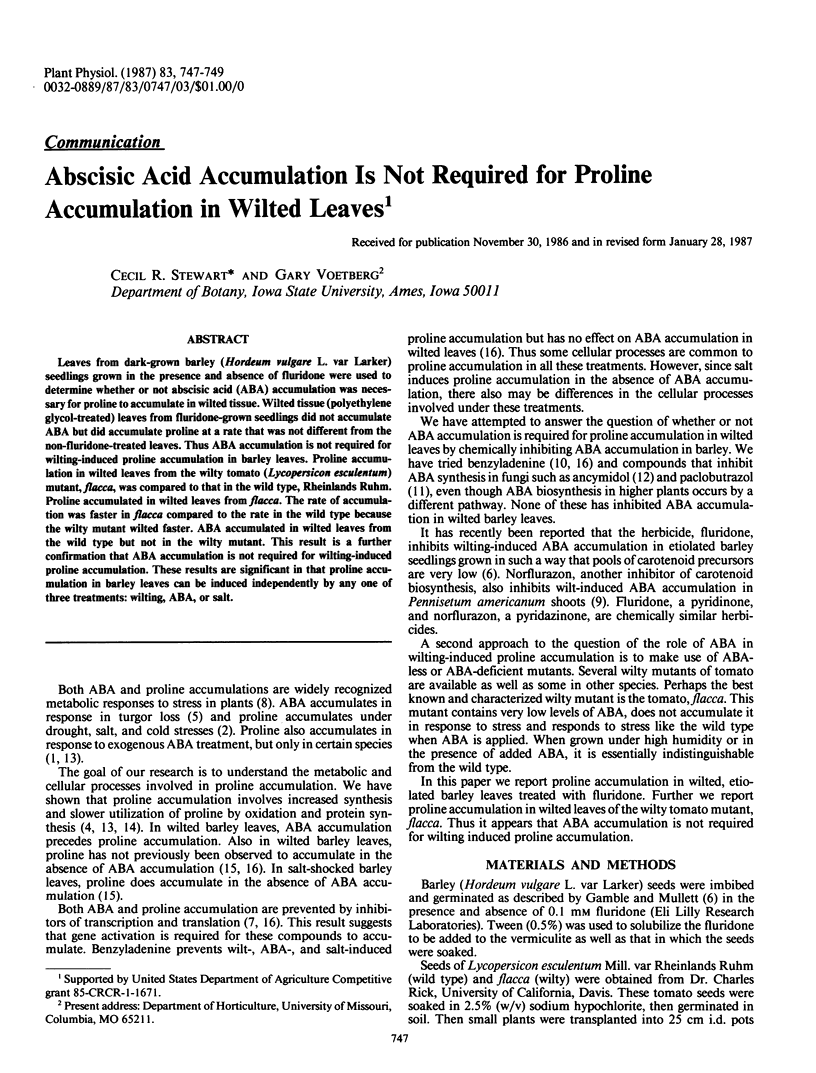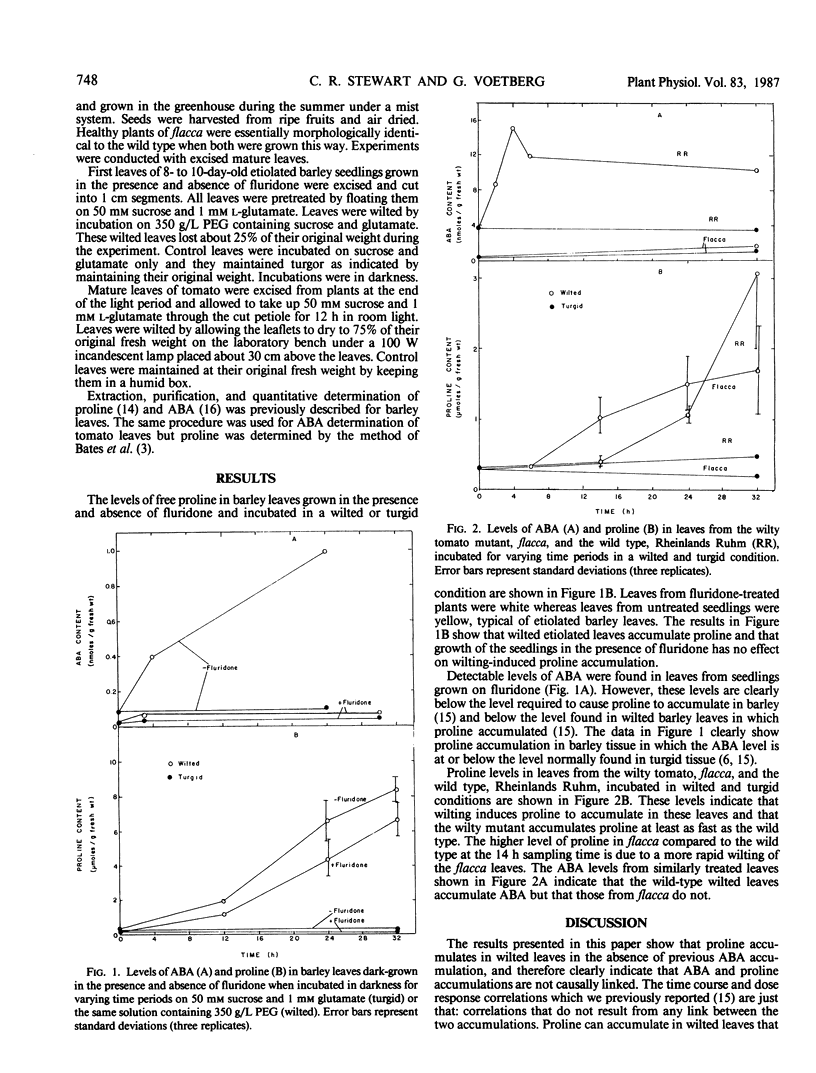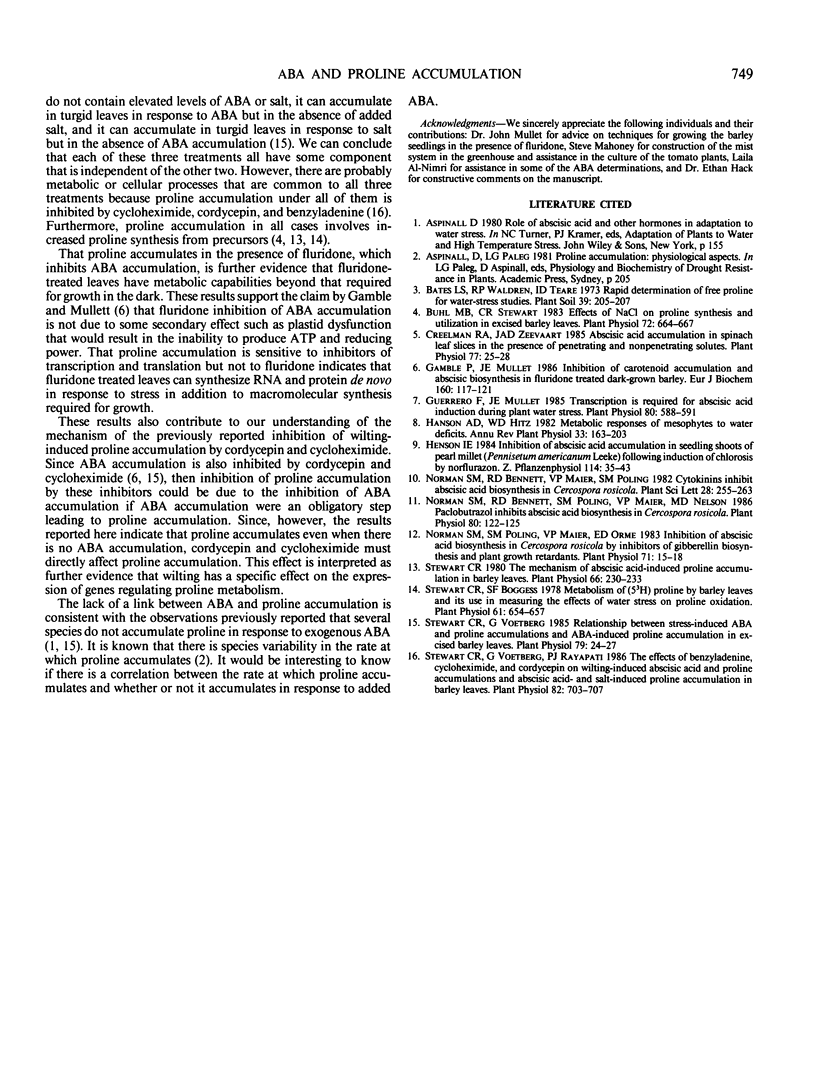Abstract
Leaves from dark-grown barley (Hordeum vulgare L. var Larker) seedlings grown in the presence and absence of fluridone were used to determine whether or not abscisic acid (ABA) accumulation was necessary for proline to accumulate in wilted tissue. Wilted tissue (polyethylene glycol-treated) leaves from fluridone-grown seedlings did not accumulate ABA but did accumulate proline at a rate that was not different from the non-fluridone-treated leaves. Thus ABA accumulation is not required for wilting-induced proline accumulation in barley leaves. Proline accumulation in wilted leaves from the wilty tomato (Lycopersicon esculentum) mutant, flacca, was compared to that in the wild type, Rheinlands Ruhm. Proline accumulated in wilted leaves from flacca. The rate of accumulation was faster in flacca compared to the rate in the wild type because the wilty mutant wilted faster. ABA accumulated in wilted leaves from the wild type but not in the wilty mutant. This result is a further confirmation that ABA accumulation is not required for wilting-induced proline accumulation. These results are significant in that proline accumulation in barley leaves can be induced independently by any one of three treatments: wilting, ABA, or salt.
Full text
PDF


Selected References
These references are in PubMed. This may not be the complete list of references from this article.
- Buhl M. B., Stewart C. R. Effects of NaCl on Proline Synthesis and Utilization in Excised Barley Leaves. Plant Physiol. 1983 Jul;72(3):664–667. doi: 10.1104/pp.72.3.664. [DOI] [PMC free article] [PubMed] [Google Scholar]
- Creelman R. A., Zeevaart J. A. Abscisic Acid accumulation in spinach leaf slices in the presence of penetrating and nonpenetrating solutes. Plant Physiol. 1985 Jan;77(1):25–28. doi: 10.1104/pp.77.1.25. [DOI] [PMC free article] [PubMed] [Google Scholar]
- Gamble P. E., Mullet J. E. Inhibition of carotenoid accumulation and abscisic acid biosynthesis in fluridone-treated dark-grown barley. Eur J Biochem. 1986 Oct 1;160(1):117–121. doi: 10.1111/j.1432-1033.1986.tb09947.x. [DOI] [PubMed] [Google Scholar]
- Guerrero F., Mullet J. E. Increased Abscisic Acid Biosynthesis during Plant Dehydration Requires Transcription. Plant Physiol. 1986 Feb;80(2):588–591. doi: 10.1104/pp.80.2.588. [DOI] [PMC free article] [PubMed] [Google Scholar]
- Norman S. M., Bennett R. D., Poling S. M., Maier V. P., Nelson M. D. Paclobutrazol Inhibits Abscisic Acid Biosynthesis in Cercospora rosicola. Plant Physiol. 1986 Jan;80(1):122–125. doi: 10.1104/pp.80.1.122. [DOI] [PMC free article] [PubMed] [Google Scholar]
- Norman S. M., Poling S. M., Maier V. P., Orme E. D. Inhibition of Abscisic Acid Biosynthesis in Cercospora rosicola by Inhibitors of Gibberellin Biosynthesis and Plant Growth Retardants. Plant Physiol. 1983 Jan;71(1):15–18. doi: 10.1104/pp.71.1.15. [DOI] [PMC free article] [PubMed] [Google Scholar]
- Stewart C. R. The Mechanism of Abscisic Acid-induced Proline Accumulation in Barley Leaves. Plant Physiol. 1980 Aug;66(2):230–233. doi: 10.1104/pp.66.2.230. [DOI] [PMC free article] [PubMed] [Google Scholar]
- Stewart C. R., Voetberg G., Rayapati P. J. The effects of benzyladenine, cycloheximide, and cordycepin on wilting-induced abscisic Acid and proline accumulations and abscisic Acid- and salt-induced proline accumulation in barley leaves. Plant Physiol. 1986 Nov;82(3):703–707. doi: 10.1104/pp.82.3.703. [DOI] [PMC free article] [PubMed] [Google Scholar]
- Stewart C. R., Voetberg G. Relationship between Stress-Induced ABA and Proline Accumulations and ABA-Induced Proline Accumulation in Excised Barley Leaves. Plant Physiol. 1985 Sep;79(1):24–27. doi: 10.1104/pp.79.1.24. [DOI] [PMC free article] [PubMed] [Google Scholar]


